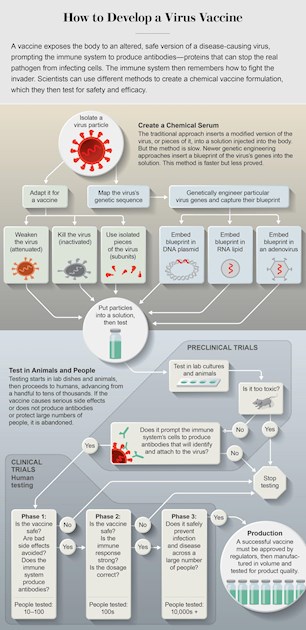Mainly of interest to geeks, but of import to everyone.
Blockbuster # 1: CRISPR-Cas9
Within weeks we expect to have several effective vaccines against the coronavirus, vaccines made from scratch and rushed to market within 12 months. Hitherto, such a development schedule for a new vaccine was unthinkable. Exactly six months ago Scientific American (from which the above infographic is taken) published a hopeful review of the main approaches being taken scientificamerican.com/arti... As it has turned out, SA's tentative "could" has become a resounding "should", if not "will, or I'll eat my hat".
The breakneck speed with which these vaccine projects have advanced has depended on the ease with which genetic information can be precisely cut from one organism, pasted into another, and modified at will, courtesy of the gene editing technology known as CRISPR-Cas9. This is a long acronym for a particular system deployed by bacteria to neutralise invading viruses, a system eventually put to work in human and animal cells. For their role in harnessing this essentially bacterial technology Jennifer Doudna and Emmanuelle Charpentier were awarded the 2020 Nobel prize in chemistry.
Unless you're already familiar with the subject, I recommend looking at a few animations e.g. youtube.com/watch?v=2pp17E4... and explanations e.g. youtube.com/watch?v=sweN8d4...
The new RNA vaccines against Covid are one example among many, and it's a safe bet that gene editing based on CRISPR-Cas9 will pervade many areas of medical research long into the future.
Blockbuster # 2: DeepMind's AlphaFold
"An artificial intelligence network developed by Google AI offshoot DeepMind has made a gargantuan leap in solving one of biology’s grandest challenges — determining a protein’s 3D shape from its amino-acid sequence". Thus begins an article in Nature published yesterday nature.com/articles/d41586-...
Proteins are large, complex molecules that play many critical roles in the body. They do most of the work in cells and are required for the structure, function, and regulation of the body’s tissues and organs. Proteins, along with genes (the segments of DNA which control the manufacture and activity of proteins), are the building blocks of life. They include enzymes, antibodies, hormones and various kinds of body tissue. While the long chains of amino acids that make proteins are easy to sequence, it's much more difficult to elucidate proteins structure, often a complex tangle of folds, twists and offshoots. While there are only 21 amino acids, there are more than 20,000 proteins encoded by genes and several million variations (proteoforms), each with its own peculiar 3-dimensional shape.
Hitherto, determining the structure of proteins has been painstaking and expensive. In the past 25 years much effort has gone into accurately predicting protein structures from their amino-acid sequence. Success would be a great boost to life sciences and medicine, turbo-charging the quest to elucidate cell biology and advance drug discovery. In this year's international competition between artificial intelligence (AI) networks aiming to predict protein structures, DeepMind's AlphaFold won hands down, and with such accuracy that it has been hailed as a revolution in biology.
